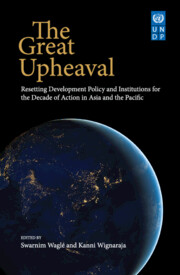Book contents
- Frontmatter
- Contents
- List of Figures
- List of Tables
- List of Boxes
- List of Appendices
- List of Abbreviations
- Foreword
- Acknowledgements
- Introduction
- 1 Aligning Sovereign Debt Financing with Climate Action in the Asia-Pacific Region
- 2 Melting Glaciers, Threatened Livelihoods: Confronting Climate Change to Save the Third Pole
- 3 Accelerating Universal Digital Connectivity
- 4 The Post-COVID-19 Future for Global Value Chains
- 5 Is Southeast Asia Falling into a Latin American–Style Middle-Income Trap?
- 6 Equality of Opportunity as a Measure of Development
- 7 Insights for Policymaking from the Multidimensional Poverty Index
- 8 COVID-19 and Human Security
- 9 Making COVID-19 Vaccine Universally Accessible
- 10 Enhancing the Provision of Global Public Goods: Ready for More Realism?
- 11 Asian-Pacific Regional Cooperation in the Post-COVID-19 Era
- 12 Pandemic Governance and Human Development: Early Lessons from Asia
- 13 Seven Lessons for Development Policy from the COVID-19 Pandemic
- About the Contributors
- Index
3 - Accelerating Universal Digital Connectivity
Published online by Cambridge University Press: 28 February 2022
- Frontmatter
- Contents
- List of Figures
- List of Tables
- List of Boxes
- List of Appendices
- List of Abbreviations
- Foreword
- Acknowledgements
- Introduction
- 1 Aligning Sovereign Debt Financing with Climate Action in the Asia-Pacific Region
- 2 Melting Glaciers, Threatened Livelihoods: Confronting Climate Change to Save the Third Pole
- 3 Accelerating Universal Digital Connectivity
- 4 The Post-COVID-19 Future for Global Value Chains
- 5 Is Southeast Asia Falling into a Latin American–Style Middle-Income Trap?
- 6 Equality of Opportunity as a Measure of Development
- 7 Insights for Policymaking from the Multidimensional Poverty Index
- 8 COVID-19 and Human Security
- 9 Making COVID-19 Vaccine Universally Accessible
- 10 Enhancing the Provision of Global Public Goods: Ready for More Realism?
- 11 Asian-Pacific Regional Cooperation in the Post-COVID-19 Era
- 12 Pandemic Governance and Human Development: Early Lessons from Asia
- 13 Seven Lessons for Development Policy from the COVID-19 Pandemic
- About the Contributors
- Index
Summary
INTRODUCTION
Even with all the progress made over the last few decades, the United Nations Development Programme (UNDP) has reported that widespread disparities remain in human development and continue to widen across many dimensions and regions (UNDP, 2019). The digital divide, or lack of universal affordable digital connectivity, is one manifestation of this trend. As depicted in Figure 3.1, gains have occurred in basic capabilities (UNDP, 2019). As with other measures of human development, those at the bottom have made advances in the basics of Internet access, such as basic mobile connectivity and limited Wi-Fi kiosk access. However, divergence appears in enhanced capabilities, including unlimited data consumption on high-speed mobile and fixed connections at home and access to cloud-based productivity tools. Gaps in enhanced capabilities exceed those in the basic ones, and gaps have continued to rise.
With rapid progress in technologies, digital inequality runs the risk of widening at an accelerating pace over time. This undermines the achievement of fundamental freedoms to make life choices. As with income inequality and other indicators of human development, reversing trends towards digital inequality calls for urgent steps in the near future. The foundational role of connectivity in human development has found wider recognition in recent years (UNDP, 2019; Broadband Commission, 2020a). Universal connectivity now appears as a fundamental element of an inclusive and sustainable world – for improving the quality of education and health care, standards of living, personal safety, freedom of choice and overall life satisfaction. One cannot achieve the United Nations (UN) Sustainable Development Goals (SDGs) without universal affordable broadband availability. The global COVID-19 pandemic has only amplified the importance of connectivity for social and economic inclusion, including access to education, healthcare, remote work and political participation. COVID-19's impact on childhood education has proven particularly acute.
With its tremendous economic and cultural diversity, the Asia and the Pacific Region (APR) very much exemplifies what we see globally on broadband availability and adoption. The data show that the APR has made significant progress over the last decade increasing the availability and affordability of Internet connectivity, but more than half of people in the APR remain offline, and fixed and mobile broadband remains unaffordable in most APR countries.
- Type
- Chapter
- Information
- The Great UpheavalResetting Development Policy and Institutions in the Asia-Pacific, pp. 74 - 99Publisher: Cambridge University PressPrint publication year: 2022



